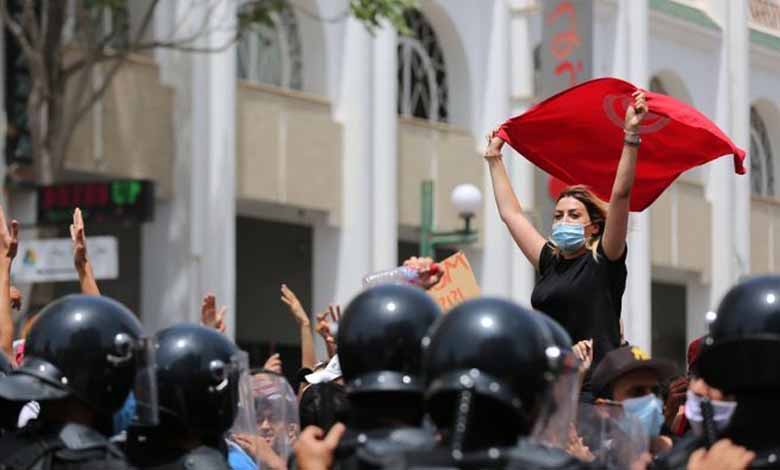The Muslim Brotherhood’s Ennahdha fails again to mobilize against the Tunisian president – Details

In a blow to Ennahdha, the political arm of the Muslim Brotherhood in Tunisia, which has always boasted of its ability to mobilize from mosques from which the movement’s symbols have been expelled over the past two months, the Tunisian people, only a few hundred, did not respond to the call of the movement and the so-called “National Salvation Front” to demonstrate against Tunisian President Kais Saied and the constitutional referendum scheduled for July 25, media reports indicated that hundreds demonstrated in the Tunisian capital yesterday, on the second day of protests against the constitutional referendum called for by Saied.
Since Saied’s call for a new constitution to be drafted and a referendum on it next month, Ennahdha and its various arms have been playing the Tunisian street against the Tunisian president and the new constitution, which has only a small part of its features, in an attempt to return to the political scene again, amid growing popular discontent against the movement and its figures, who are facing “documented” accusations of involvement in financial and political corruption and the assassination of political activists.
At the end of May, Saied appointed Sadok Belaid, a law professor, as co-ordinator of the National Consultative Commission charged with drafting a new constitution.
Belaid himself was not spared the attacks of the Muslim Brotherhood movement, as he was accused of blasphemy, after his statements on the erasure of the religious identity of the Tunisian state in the draft of the new constitution, in order to close the door for return to Ennahdha and other political movements and parties that used religion as a cover for political gains for which the sanctity of homelands, money and souls was forgiven.
The draft constitution of Belaid was not taken for granted by Saied, who called for a comprehensive political dialog that was already launched on June 4 to discuss the articles of the constitution, especially the economic aspect that faced intense opposition that amounted to a strike by the Tunisian Labor Union.
At the end of last March, Saeed announced the dissolution of parliament after eight months of suspension on July 25, 2021, as part of exceptional measures that his opponents described as a coup against legitimacy, while Ho confirmed that it is a correction to the revolutionary course.
On July 25, Saied announced the freezing of the work of the parliament, before its dissolution last March, and the dismissal of former Prime Minister Hichem Mechichi. He then approved a political road map, which began with an electronic consultation. He will organize a popular referendum on July 25th on a new constitution, leading to legislative elections at the end of this year.
Saied’s decision to dissolve the parliament came hours after a number of MPs defied suspension procedures and held a video session during which they voted to cancel the extraordinary measures announced by the president on July 25. In response to the frozen parliament session, Saied said: “If they want to divide the country and sow discord, the stars of the sky are closer to them than that, and what they are doing now is a flagrant conspiracy against the security of the state”.












